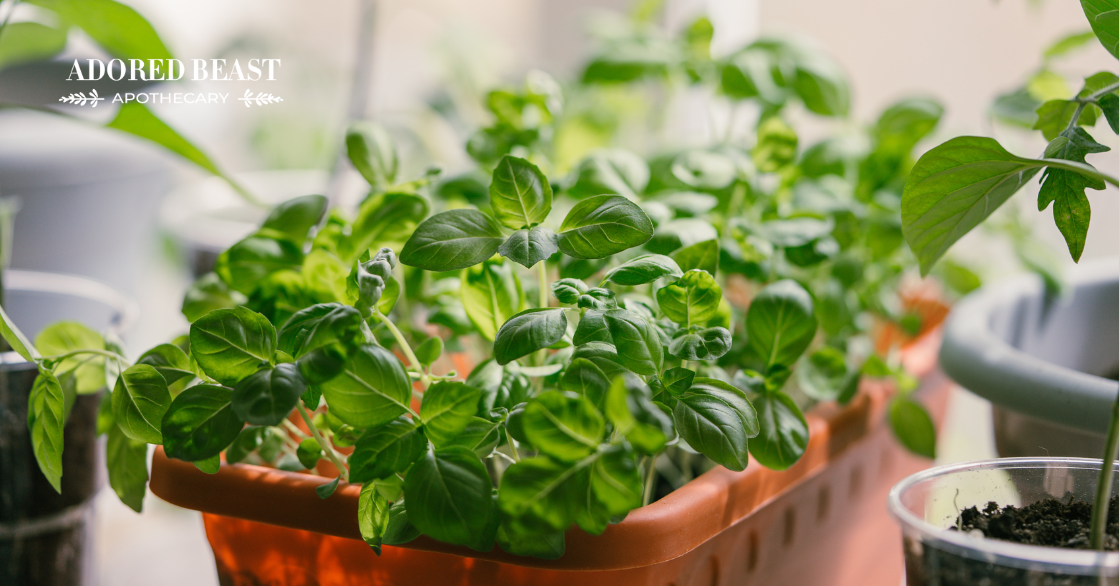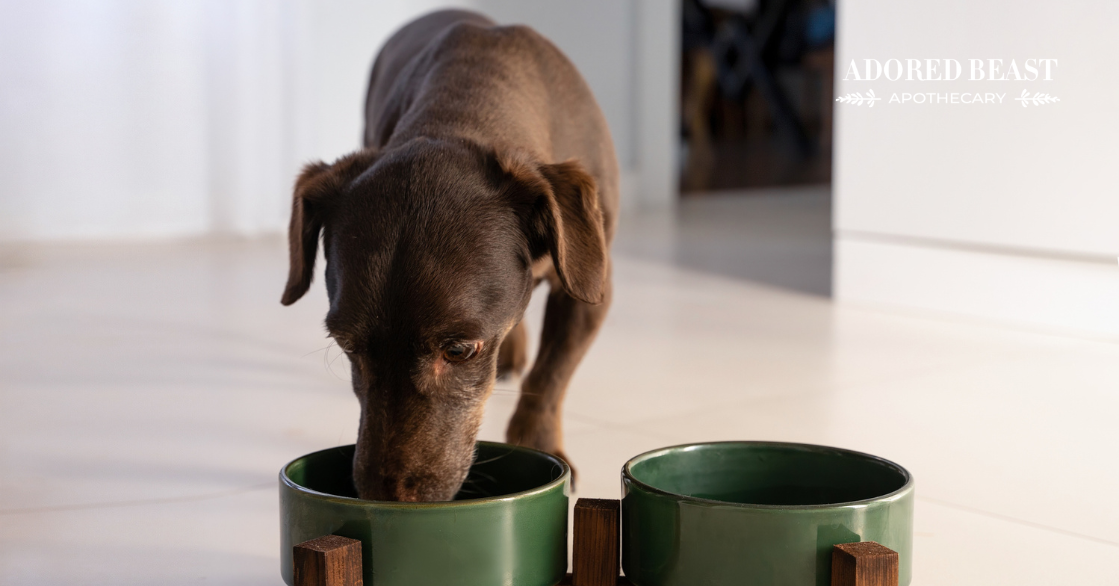Let’s be honest, our canine companions are not always the most discerning eaters. One minute they’re scarfing down our carefully curated, well-balanced meals, and the next they’re sniffing out “mystery snacks” on the sidewalk. So it’s no wonder that sometimes their tummies stage a rebellion. The good news? You don’t have to reach for harsh medications to support your pup’s digestive health. Your kitchen or garden might already be stocked with gentle, natural remedies that support dog digestion!
Here are 7 dog-safe herbs that can help keep your pup’s digestive system running smoothly—and maybe even make mealtime more flavourful.
7 Herbs for Dog Digestion
There are several different herbs that can help soothe or improve dog digestion.
1. Ginger: The Anti-Nausea Hero
Just like your grandma recommended ginger tea for a queasy stomach, ginger can work wonders for dogs too! This zesty root helps settle upset stomachs, reduce gas, and fight nausea. It’s especially helpful for motion sickness, so try giving your pup a small amount before a car ride.
How to Use It: Add a pinch of powdered ginger to your dog’s food or brew a mild ginger tea and let it cool before offering a spoonful.
Cautions: Avoid giving ginger to dogs with bleeding disorders, dogs having surgery soon, and dogs taking Non-Steroidal Anti-Inflammatory Drugs (NSAIDs), because ginger acts as a blood thinner. Also, ginger can be too hot for dogs that pant a lot or run hot.
2. Chamomile: The Calm-Down Herb
Chamomile isn’t just for winding down humans—it helps soothe irritated tummies too. It relaxes the digestive tract and reduces inflammation, making it a go-to for stress-related indigestion. Bonus: externally, chamomile soothes, calms, and it also has antimicrobial properties that can help with itching, skin rashes, and inflammation.
How to Use It: Brew chamomile tea, let it cool completely, and add a spoonful to your dog’s water or food.
3. Fennel: The Gas Buster
Fennel is like a breath of fresh air – for your dog’s tummy and yours! This sweet, licorice-flavoured herb can ease bloating, relieve gas, and support overall digestion. Fennel provides dietary fiber, which is beneficial for digestive health, as well as vitamin C, vitamin A, calcium, iron, and potassium. Bonus: It can freshen your pup’s breath too.
How to Use It: Use fennel fresh or dried seeds to make a tea. Add one teaspoon of either to 8 ounces of boiling water. Leave the mixture to steep, then strain. You can give your dog two to four teaspoons of the mixture to their regular food.
Cautions: Be aware of the difference between edible fennel and “Dog Fennel,” which is a different plant and can be toxic to dogs.
4. Peppermint: The Cool Cucumber of the Herb World
Peppermint isn’t just for candy canes. This herb cools inflammation in the gut and can help with indigestion, nausea, and cramping. It’s particularly helpful for dogs with IBS-like symptoms.
How to Use It: A fresh peppermint leaf chopped and mixed into food can often do the trick. You can also brew a mild peppermint tea and put a few teaspoons on your dog’s dinner.
Cautions: Peppermint essential oils or extracts are way too much, even in small quantities. Use only fresh peppermint for your pup.
5. Parsley: More Than a Pretty Garnish
Parsley often sits quietly on the edge of your plate, but it’s got secret superpowers. It’s rich in chlorophyll, which helps fight bacteria in the gut and freshen doggy breath. It can also help support the kidneys. Its diuretic properties help it filter toxins through the body and out through urine.
How to Use It: Finely chop fresh parsley (curly leaf is safest) and sprinkle a bit over your dog’s meal.
6. Dill: The Dog Digestion Whisperer
Dill isn’t just for pickles! This fragrant herb can soothe an upset stomach, reduce gas, and ease hiccups or burping in dogs. It also has antimicrobial properties, helping fend off some bad gut bugs.
How to Use It: Use fresh dill in small amounts or steep the dried version into a tea to mix into food or water.
7. Basil: The Antioxidant All-Star
Basil is more than a pizza topping! It’s a powerful herb with anti-inflammatory and antimicrobial properties. It can help ease digestive discomfort and even reduce nausea.
How to Use It: Chop up a fresh basil leaf or two and stir it into your dog’s dinner. A little goes a long way!
A Few Notes Before You Spice Things Up
Herbs can be powerful natural medicine, so you want to keep these in mind if you’re new to them.
- Always introduce new herbs in small amounts to see how your dog reacts.
- Use fresh or dried culinary herbs, not essential oils—many are too strong or toxic for dogs.
- If your dog doesn’t like one of these, don’t force it, just pick another one.
- If your dog has a health condition or takes medications, check with your vet before introducing new herbs.
Supporting dog digestion doesn’t have to be difficult. Sometimes, the best remedies are already sitting in your spice rack or in a planter on your windowsill. With these dog-friendly herbs, you can soothe tummy troubles naturally, and maybe even add a little gourmet flair to your pup’s dinner!












